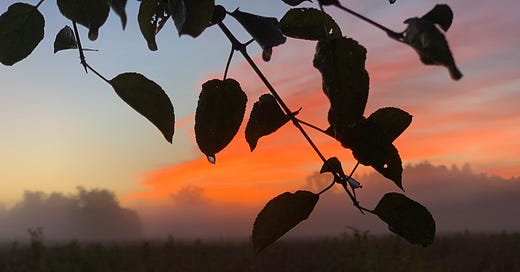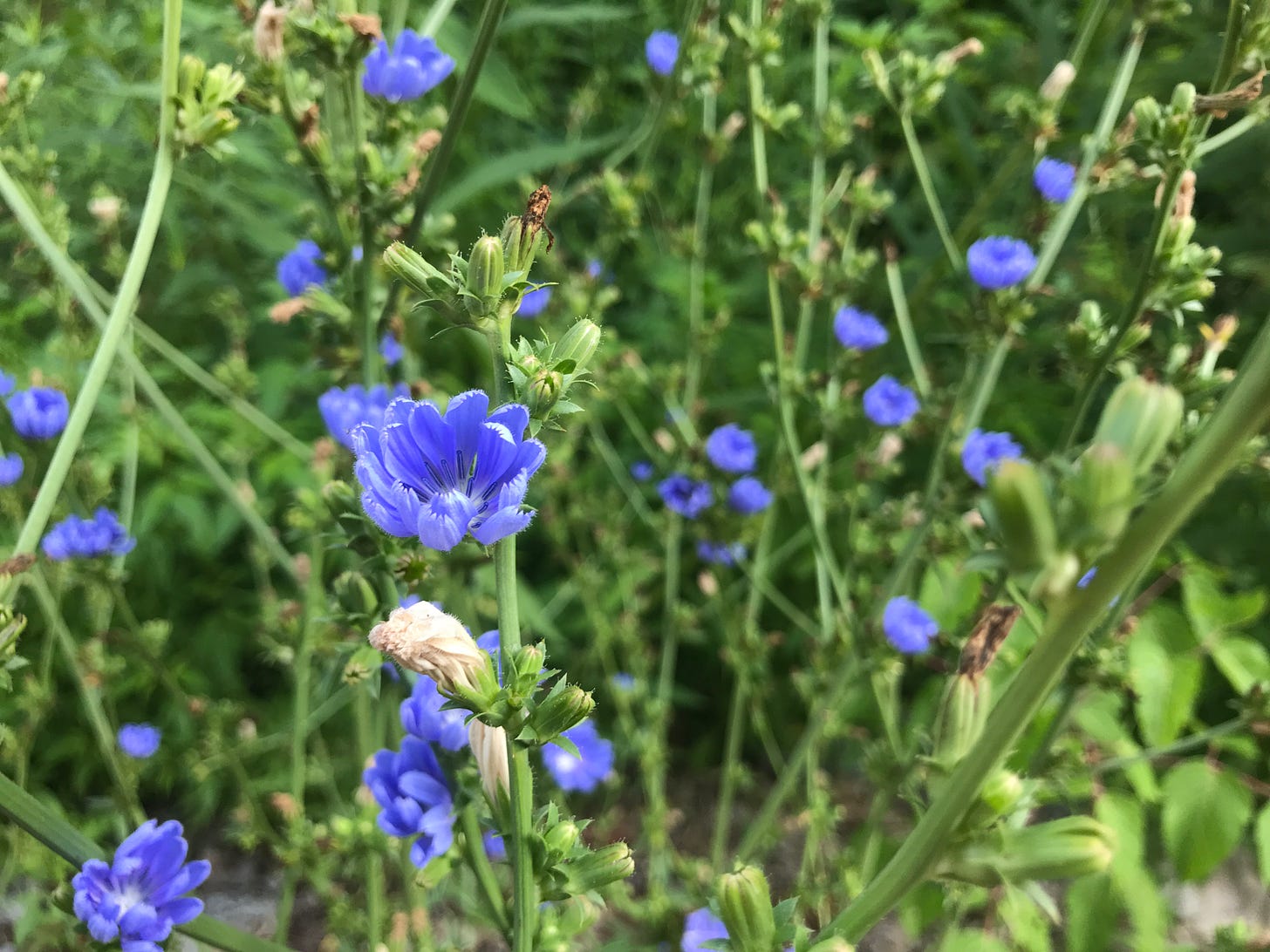This Beautiful and Aching World
a slipstream exploration of joy in ordinary acts of attention in a time of global sorrow
Some mornings this past week, I woke with an ache already in my chest, not for something personal, but for the world: the recent floods in Texas; the constant loss of life and destruction in Ukraine; the mothers and children in Gaza; the Israeli hostages still not home; the suffering and losses that pile up in places the headlines forget to name. Some mornings, it feels like everything is breaking open at once. I try not to make reading the news the first thing I do, but because I have intimate family connections in Ukraine, I often find myself searching for the latest updates. Even without such connections, we are each feeling the weight of suffering around the world. That ache is very real.
Still, I get out of my cosy bed, lovingly greet and feed my hungry cats, light a candle on my desk, make utterly delicious coffee. I stand by the window while the machine brews, and I see the way the first light touches the edge of the trees and shades of rose and apricot paint the early sky. It sometimes feels almost indecent, these luxuries, this beauty, yet it’s all right here and I am grateful. Maybe you have experienced these conflicting feelings, too.
(Like dew clinging to the grass—small, shimmering, ordinary, and gone by noon, but so incredibly beautiful and so real.)

I’ve long believed that there is no healing without joy. Not the loud kind, not the joy that demands balloons or big celebrations, but the quieter kind. The kind that arrives unannounced and can just as suddenly leave without explanation. The kind that does not ask us to forget the sorrows, but says: let me sit beside you for a moment. Slowly, persistently I’ve learned that joy is not what comes after the ache. It is not the prize for endurance, not the ribbon tied at the end of suffering. It walks beside it and it always has.
Joy is not the opposite of sorrow. They breathe together. Inhaling, exhaling, giving and taking along one infinite luminous thread. Sometimes sorrow swells so large it crowds the room, yet still, somewhere in the corner, joy sits with her knees tucked to her chest, patient and present, waiting. Joy, to me, is not pleasure and it’s not always happiness. No, it’s something quieter, something older.
It’s the softness of light on a worn wooden floor.
It’s the moment the watercolour touches wet paper—how it moves, mingles, surprises you with its aliveness. That exquisite randomness. That breath of something beyond your control.
It’s the string of words that can come while writing, and that you read back and wonder…from where did those beautiful words come?
It’s the feeling, even in grief, that you are still here. Still alive enough to notice.
And so I look for it, not to escape, but to survive with a bit more grace.
I look for it because I know: healing doesn’t wait for the world to make sense.
Healing begins in the same breath that holds the sorrow.
(Like a single cornflower growing at the edge of the rubble—not despite the ruin, but because of it.)
I want to be careful here because I know there are days—even whole seasons—when joy feels like a foreign language, and the invitation to “choose joy” lands like a stone. There is a danger in making joy sound like a command, as if it can be summoned by willpower or framed as a moral imperative.
Some days, you’re just breathing. Just getting through.
Some days, joy doesn’t rise. Not even faintly.
Maybe the deepest kindness is to say: that’s okay. We don’t have to chase it. We don’t have to earn our place in the world by being okay. There is nothing inconvenient about our grief. Nothing shameful in our silences or our sadness.
If you fear that noticing joy might dishonour the suffering of others—I understand. It can feel dissonant to laugh while the world burns, to taste a ripe peach while people are starving, to light a candle while someone’s home has been swept away, but I also understand—truly—that the heart can hold both, and that witnessing beauty is not betrayal.
Still, if joy doesn’t come today, you are not less alive.
You are not doing it wrong.
(Even the frozen stream holds the memory of movement. Even the winter branch still carries the memory of the blossom it once held and will hold again.)

There have been many days when I didn’t go looking for beauty, but it came anyway—small, unannounced: the curl of steam from my mug; a single sparrow on the edge of the birdbath, feathers ruffled by wind; an exquisite line in a poem I almost skipped over, but then didn’t.
These flashes of beauty are not always comfort or relief, but they are something. A flicker. Not optimism, not escape. Just the faint, shimmering proof that beauty still exists even when nothing else makes sense. In that moment of noticing, without trying, I have felt myself soften, even just slightly, as if some part of me remembered what it means to be truly alive in this beautiful and aching world.
(Like light catching in the chipped rim of a glass—not meant to glow, but glowing all the same.)
I don’t have much to offer today, no tidy ending, no map, but this is where I’ve ended up: maybe we don’t have to wait until the grief has passed to notice the stream of light and dancing shadows on the floor. Maybe sorrow and beauty can sit at the same table, not to cancel each other out, but to remind us we are still here. Still breathing. Still capable of being moved. Still noticing what the heart can’t bear, and what it quietly longs for.
Maybe that’s what it means to be awake, or to use the cultural word of the moment, to be woke. Maybe the purpose is to feel the weight and the wonder, side by side. To let the flicker of hope remain, even if we don’t know what to do with it. Even if it feels trite or naïve, or out of place.
And maybe this is why it matters, this noticing, this remembering, this acknowledgment of beauty. Not so we can turn away from the world’s suffering, but so we can stay with it longer. So we don’t go numb. So our eyes stay open, not only to the grief, but to what is still worth protecting. When we let ourselves be touched by the light on the floor, the steam from the cup, the bird on the branch, we come back into our aliveness. And from that place—tender, rooted, awake—we are more able to love this world, and more willing to help mend what’s breaking.
(No answers, only the warmth of the cup
held between my hands.

End note: I want to acknowledge the names of places where there is ongoing conflict and suffering, in places around the world we might not hear as much about: Gaza, Israel, all of the Middle East, Yemen, Ukraine, Sudan, Democratic Republic of Congo, South Sudan, Amhara (Ethiopia), Cameroon, Haiti, Syria, Afghanistan, Myanmar… and on and on.
Approximately 300 million people worldwide are in need of humanitarian assistance—for food, safety, medical care, and shelter.¹
Nearly 1 in 5 children—about 473 million—live in conflict zones, experiencing levels of violence and disruption that endanger their development and well-being.²
This list is offered not to flatten unique histories or reduce suffering to headlines, but to acknowledge that suffering and grief and hope and joy exist everywhere.
Footnotes
¹ United Nations Office for the Coordination of Humanitarian Affairs (UNOCHA), Global Humanitarian Overview 2024,
https://www.unocha.org
² UNICEF estimate reported in The Guardian, "Almost one in five children live in conflict zones, says Unicef", 28 December 2024, https://www.theguardian.com/society/2024/dec/28/almost-one-in-five-children-live-in-conflict-zones-says-unicef.








Today, like many other times I have read your essays, I find myself holding my hand over my heart as I feel the ache mixed with an outbreath that releaves it. Shadow and light. Grief and joy... A delicate balancing act that is my humanity. As always, thank you.
Oh my gosh. I just knew I had to take the opportunity in the quiet of this morning, as I sip my coffee, to read your Fleeting, Breathing, Human Things post from yesterday. I’m so glad I did. It was so moving and rich with feeling and imagery. Thank you for putting into words with such clarity this process that kind of sums everything up. There are so many gifts of beauty and expressions of the love that holds each of us, every day and all day and night—if we wake to see them, they fill the cup of our heart and help us to hold what our minds tell us we can’t. That I should feel whole, despite the tears that fell while reading this, is not, after all, a surprise. Grief and joy walked with me as your words touched my heart.